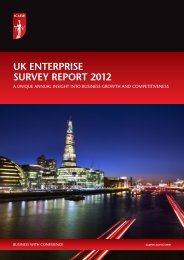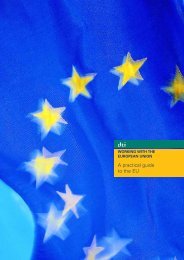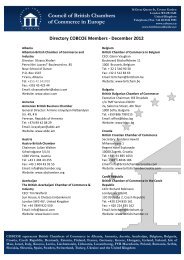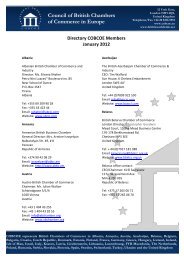Free Movement of Goods - Gov.uk
Free Movement of Goods - Gov.uk
Free Movement of Goods - Gov.uk
Create successful ePaper yourself
Turn your PDF publications into a flip-book with our unique Google optimized e-Paper software.
Each Member State is responsible for the legal systems within its own territorythat allow for owners <strong>of</strong> IP to enforce their rights. An EU Directive ensures aminimum level <strong>of</strong> protection in the civil courts. Enforcement is normally throughnational courts for both civil remedies and criminal sanctions. In the case <strong>of</strong> EUwiderights for trade marks and designs, the designated national courts act asCommunity courts and rule for the whole EU in relation to civil procedures andremedies. An EU Directive provides some element <strong>of</strong> harmonisation in relation tocivil procedures and remedies.In the field <strong>of</strong> online infringement <strong>of</strong> copyright, Member States such as the UK,France and Spain share best practice and new approaches to the problems theyall face. The European Observatory on Counterfeiting and Piracy also bringstogether Member States’ administrations, private industry and consumerorganisations to improve efforts to combat counterfeiting and piracy throughjoining forces, exchanging experiences and information and sharing bestpractices on enforcement.EU customs rules allow customs authorities to intervene where goods suspected<strong>of</strong> infringing an IP right are detected at the external border <strong>of</strong> the EU. TheRegulation covering IP enforcement is due to be updated on 1 January 2014.Separate arrangements are in place for handling counterfeit medicines andmedical devices under health legislation and have been covered in the Call forEvidence for the Health review.The EU is able to negotiate internationally on areas <strong>of</strong> IP that fall into the aboveareas <strong>of</strong> competence. For example, a number <strong>of</strong> EU <strong>Free</strong> Trade Agreementswith non-EU countries have allowed recognition <strong>of</strong> EU Geographical Indicationsin those countries' markets, and vice versa. Where areas <strong>of</strong> IP that fall outsideEU competence are discussed in trade negotiations, Member States take thelead, usually via the rotating Presidency. (1) The same applies in multilateral forasuch as the World Intellectual Property Organisation (WIPO), where competenceis shared: the UK works within the EU context to ensure coherence, but stillengages directly on most topics.There is little EU competence in the management and exploitation <strong>of</strong> intellectualproperty, including licensing, although the Commission’s recent proposals fortrade marks includes some high level provisions in this area. The exception iswhere the exercise <strong>of</strong> intellectual property rights may fall foul <strong>of</strong> EU competitionrules. The EU has exclusive competence in the area <strong>of</strong> competition and this willbe considered in a separate report in semester 3, which will be launched inautumn 2013.(1) The rotating presidency <strong>of</strong> the European Council sees each a new EU nation takeresponsibility for the functioning <strong>of</strong> the Council <strong>of</strong> the European Union, the upper house <strong>of</strong> the EUlegislature, the “presidency” changes every six months.15








